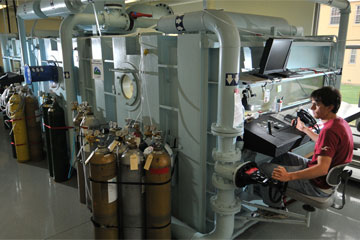
By David Kelly | University Communications
AURORA, Colo. (Jan. 23, 2014) – After months of planning, the University of Colorado Travel, Expedition, and Altitude Medicine (TEAM) clinic is up and running, offering advice and treatment to a wide range of travelers.
The clinic, staffed by nearly a dozen physicians with a variety of specialties, is among the first in the nation to provide comprehensive treatment for all medical issues associated with travel and altitude.
“If you are planning a jungle trek, a safari or high altitude expedition, we can help with the medical issues surrounding the activity,” said Christopher Davis, MD, an emergency medicine physician and an expert in wilderness medicine. “This is a collaborative venture using experts in infectious disease, pediatrics and emergency medicine to provide state-of-the-art medical care.”
The university has operated a smaller altitude clinic for years but this latest venture is far larger and more diverse, drawing on a deep reservoir of expertise from around the CU Anschutz Medical Campus.
At the same time, it’s taking advantage of pioneering research being done at the CU Altitude Research Center (ARC) which has made major strides in discovering the causes of hypoxia or acute mountain sickness. ARC is working on a blood test that can identify those likely to get sick at altitude. It also has a hypobaric chamber, the only one in civilian use, which can simulate various altitudes and measure physiological responses to them.
“We can bring you up to altitude in the chamber and do a variety of tests,” said Benjamin Honigman, MD, medical director of the clinic and former director of ARC. “We have done EEGs, eye tests, cardiac tests and blood tests.”
Honigman said many hospitals offer travel clinics but this one is unique.
“We are the only group that takes a multidisciplinary approach to travel,” he said. “Let’s say someone is planning a trip to Peru and wants to spend time in the jungle and then go up to Machu Picchu. We can prepare them for both environments.”
Several of the doctors at the clinic, including Davis and Monica Carten, have earned certification diplomas in tropical medicine from the prestigious London School of Hygiene & Tropical Medicine.
“If you come to see me for pre-travel advice you are getting someone with very specialized training,” said Carten, MD, an infectious disease specialist at the University of Colorado School of Medicine. “I just saw a family heading for India. They were going to the north and south of the country. We talked about the specific risks in each place.”
The clinic can also help travelers deal with underlying conditions affected by altitude like pregnancy, migraines, asthma, seizures and pediatric issues.
Along with advice, it provides vaccines and drugs to treat or prevent a variety of maladies like diarrhea and malaria.
Carten noted that more people than ever are traveling now.
“These days people are living longer and traveling longer,” she said. “So we are seeing older travelers who often have a range of health issues.”
The clinic, located in the University of Colorado Hospital’s Anschutz Outpatient Pavilion, is now open and seeing patients. So far they’ve counseled someone about to climb Mount Kilimanjaro, helped a traveler in Colorado deal with problems of altitude and advised a woman worried over how traveling in the mountains could affect her pregnancy.
The TEAM clinic hopes to build a national and global reputation for its expertise and reach.
“Our goal is nothing less than being recognized as the best clinic of its kind in the world,” Davis said.
For an appointment please call 720-848-2631.
Contact: David.Kelly@ucdenver.edu
